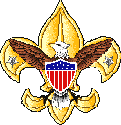| MERIT BADGES |
|
|
|
|
| Note: Eagle Required are in Italics |
"A"
American
Business
American Culture
American Heritage
American Labor
Animal Science
Archaeology
Archery
Architecture
Art
Astronomy
Athletics
Atomic Energy
Auto Mechanics
Aviation
"B"
Backpacking
Basketry
Bird Study
Bugling
"C"
Camping
Canoeing
Chemistry
Cinematography
Citizenship
Community*
Citizenship Nation*
Citizenship World*
Climbing
Coin Collecting
Collections
Communications*
Computers
Cooking
Crime Prevention
Cycling*
"D"
Dentistry
Disability Awareness
Dog Care
Drafting
"E"
Electricity
Electronics
Emergency
Preparedness**
Energy
Engineering
Entrepreneurship
Environmental
Science*
"F"
Family Life*
Farm Mechanics
Fingerprinting
Fire Safety
First Aid*
Fish & Wildlife Mgmt.
Fishing
Fly Fishing
Forestry
"G"
Gardening
Genealogy
Geology
Golf
Graphic Arts
"H"
Hiking
Home Repairs
Horsemanship
"I"
Indian Lore
Insect Studies
"J"
Journalism
"K"
"L"
Landscape Architecture
Law
Leatherwork
Lifesaving**
"M"
Mammal Study
Medicine
Metalwork
Model Design & Building
Motorboating
Music
"N"
Nature
"O"
Oceanography
Orienteering
"P"
Painting
Personal Fitness**
Personal Management*
Pets
Photography
Pioneering
Plant Science
Plumbing
Pottery
Public Health
Public Speaking
Pulp and Paper
"Q"
"R"
Radio
Railroading
Reading
Reptile & Amphibian Study
Rifle Shooting
Rowing
"S"
Safety
Salesmanship
Scholarship
Sculpture
Shotgun Shooting
Skating
Skiing
Small Boat Sailing
Soil & Water
Conservation
Space Exploration
Sports**
Stamp Collecting
Surveying
Swimming**
"T"
Textile
Theatre
Traffic Safety
Truck Transportation
"U"
"V"
Veterinary Medicine
"W"
Water Skiing
Weather
Whitewater
Wilderness Survival
Wood Carving
Woodwork
"X"
"Y"
"Z"
 Crime Prevention Crime PreventionRequirements 1996 |
- Define "crime" and "crime prevention."
- Prepare a notebook of newspaper and other clippings that addresses crime and crime prevention efforts in your community.
- Do the following:
- Talk to a store owner or manager about the impact of crime on the way the store is run and how crime affects prices.
- Talk with a school teacher, principal, or school officer about the impact of crime in your school.
- Explain what a neighborhood watch is and how it can benefit your neighborhood.
- Define white-collar crime and explain how it affects all citizens of the United States.
- Discuss the following with your counselor:
- The role of a sheriff's department or police department in crime prevention
- The role of citizens, including youth, in crime prevention
- Gangs and their impact on the community
- When and how to report a crime
- The role and value of laws in society
- Do the following:
- Inspect your neighborhood for opportunities that may lead to crime. Learn how to do a crime prevention survey.
- Using the checklist in the Crime Prevention Merit Badge pamphlet, conduct a security survey of your home and discuss the results with your family.
- Teach your family or patrol members how to protect themselves from crime at home, at school, in your community, and while traveling.
- Visit a jail or detention facility. Discuss your experience with your counselor.
- Discuss with your counselor the purpose and operation of agencies in your community that help law enforcement personnel prevent crime, and how the agencies help in emergency situations.
- Discuss the following with your counselor:
- How drug abuse awareness programs, such as "Drugs: A Deadly Game" help prevent crime.
- Why alcohol, tobacco, and marijuana are sometimes called "gateway drugs" and how "gateway drugs" can lead to the use of other drugs.
- Three resources in your city where a person with a drug problem or drug-related problem can go for help.
- How the illegal sale and use of drugs lead to other crimes.
- How to recognize child abuse.
- The "three Rs" of Youth Protection.
|
||||||
Last Update May 15, 2023

.jpg)
